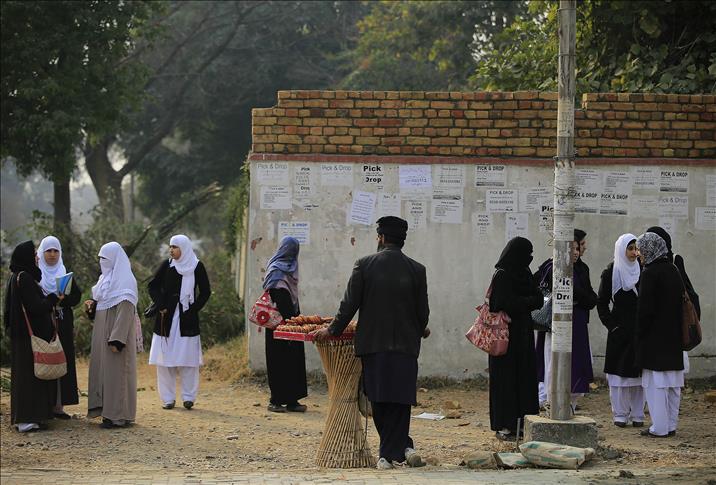Pakistanis worried schools facing rising risk of attack
Pakistanis are concerned the country has not done enough to prevent repeat of Peshawar school tragedy

By Sardar Hussain
PESHAWAR
In the wake of December's deadly massacre at a school in the city of Peshawar, Pakistanis are increasingly worried about a perceived deteriorating security situation, especially for schools.
Violence that for much of 2014 was concentrated in the country's northwestern tribal belt, where the Pakistani Taliban and other militant groups are strongest, appears to have begun spilling into the cities.
In recent weeks there have been grenade attacks on schools in the commercial city of Karachi and a bomb was defused outside a school in Bannu, a city in the northwestern Khyber Pakhtunkhwa district which hosts high numbers of internal refugees displaced by clashes between the army and militants.
Other public attacks have included the killing of five customs officials in the district of Kohat, the bombing of a Shia mosque that killed scores of people and at least three attacks in less than a month on anti-polio vaccinators.
The sense of fear is heightened in Khyber Pakthunkhwa, where the provincial capital Peshawar witnessed the killing of more than 150 people by Taliban gunmen in December.
Schools in the province have increased security in line with government guidelines but some institutions have also decided to increase their fees, a decision that has angered many parents.
Hamid Afridi, whose two sons study at a private school in Peshawar, claimed the fees have been hiked under the pretext of increased security but in reality there will be little security improvement as a result of the new measures.
Parents feel the measures, which include protection for school buses and increased security guards around school premises, are not enough and that government in at a loss over how to effectively protect schools from militant attacks.
School buses are of particular concern because they rarely have enough guards, if any, to protect them and are easily identified.
Senior Peshawar police officer Ijaz Ahmad told Anadolu Agency that as many as 2,000 educational institutions have been inspected but just over 200 met the new security guidelines.
Dr. Mian Saeed, the Senior Superintendent of Police Operations, said senior police officials and the education department held a joint meeting where police said they cannot provide security to all schools.
“We also told them that most of education institutions don’t qualify for security NOCs (no objection certificates). We also told them that regulating schools and college's fees is their job,” Saeed said.
He said that the explosives left outside the college in Bannu had partially damaged its walls and gate.
“We had informed [the college's] management to increase security but they didn’t and we didn’t give them security NOC,” said Saeed. “There are thousands of schools and colleges and we cannot deploy police on all the gates of these institutions and also cannot provide policemen as guard to their buses. Only a few schools and colleges have adequate security measures.”
Khyber Pakhtunkhwa government has asked schools to keep two security guards; one at the entrance and another on the roof of the school. Teachers have also been allowed to carry licensed firearms, to use in case of an attack.
Provincial Chief Minister Pervez Khattak said in January that schools without satisfactory security would be closed down.
"After Army Public School, I am always occupied with security nightmare as the Taliban have started killing our future," said Jawad Malik, who has sons in two different public schools. "Our kids are our future and they are hell-bent on destroying it. Our present is already in a hellhole, but why should our future be targeted? What’s their crime?”
Anadolu Agency website contains only a portion of the news stories offered to subscribers in the AA News Broadcasting System (HAS), and in summarized form. Please contact us for subscription options.







